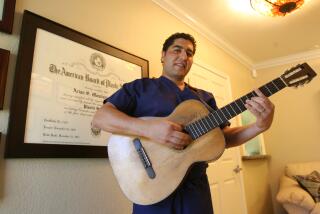Cosmetic Surgery a Territorial Gray Zone
- Share via
If a dermatologist wants to perform open heart surgery, can he?
There is nothing to stop him from doing so, according to the American Medical Assn. Once a physician has a medical license, theoretically he is free to practice any kind of medicine he wants even if his expertise is limited.
In most cases, physicians restrict their practice to specialties for which they have been trained. But within the medical community there is debate over which procedures belong to which physicians.
One of those debates is being waged by some ear, nose and throat physicians and plastic surgeons over who should be able to perform cosmetic surgery.
Above, Below Neck
Many ear, nose and throat physicians perform plastic surgery above the neck, but when they use their scalpel below the neck, to perform a breast implant or thigh lift, for example, certified plastic surgeons complain that the those physicians are trespassing into their territory.
Plastic surgeons contend that physicians who practice plastic surgery even though they received their training in other medical specialties pose a potential danger to the public.
Ralph J. W. Small, who is now facing a possible revocation of his medical license from the state Board of Medical Quality Assurance, was one of those ear, nose and throat physicians who performed cosmetic surgery until he was ordered to stop after he was convicted of involuntary manslaughter in the death of a patient.
Surgeons Form Own Group
Uncertified plastic surgeons, the bulk of them being ear, nose and throat physicians, formed their own group in 1979, called the American Board of Cosmetic Surgery, based in Los Angeles. As yet, the board, with 168 members, is not recognized by the American Medical Assn.
Richard Aronsohn, the president of the board, said certified plastic surgeons object to his group because they want to monopolize the market. He contends that surgeons do not have to undergo rigorous years of plastic-surgery training to perform cosmetic surgery. But in turn, Aronsohn said, the cosmetic-surgery board’s membership requirements are so strict that it precludes inept doctors from joining.
The American Board of Otolaryngology, which represents roughly 90% of the ear, nose and throat physicians, sides with the certified plastic surgeons. Its official policy states that surgery performed outside the face and neck area is outside the scope of an ear, nose and throat physician unless it is connected with the treatment of the head and neck.
Certified plastic surgeons say the cosmetic-surgery board has the effect of misleading patients to believe physicians who belong to it are certified in plastic surgery, said Robert Miner, former president of the Orange County Society of Plastic Surgeons.
Aronsohn, however, said his group does not pretend to be made up of plastic surgeons. He said there is a big difference between a cosmetic surgeon who improves a healthy person’s appearance and the plastic surgeon who has the expertise to treat burn victims and others who have been maimed in accidents.
“I am a beauty surgeon,” Aronsohn said. “I make people look beautiful.”






